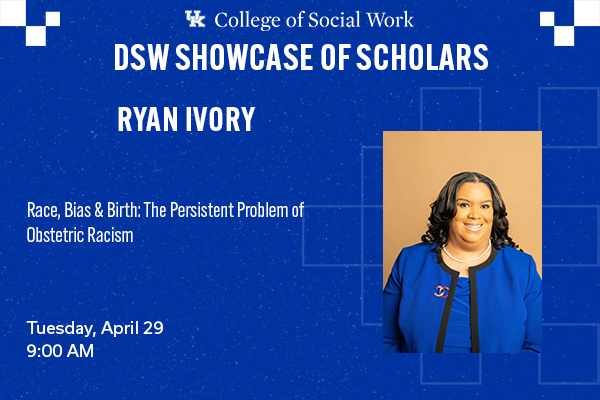DSW Candidate – Ryan Ivory, 9:00 AM – 10:15 AM
$0.00
Virtual Showcase of DSW Scholars 2025 Event!
Race, Bias & Birth: The Persistent Problem of Obstetric Racism
DSW Candidate – Ryan Ivory, mSW, LISW-S
Tuesday, April 29, 2025
9:00 AM- 10:15 AM Eastern Time Zone
Credit Hours: 1.0 (ACE)
Description
Race, Bias & Birth: The Persistent Problem of Obstetric Racism
This presentation will explore the pervasive issue of obstetric racism, a critical yet often overlooked aspect of systemic inequity in healthcare. Obstetric racism refers to the discriminatory practices and biases that disproportionately affect women of color during pregnancy, childbirth, and postpartum care. The presentation will begin by defining obstetric racism and providing a historical context, highlighting how entrenched racial disparities in maternal health outcomes have persisted over time, rooted in both historical and contemporary inequalities. We will delve into the ways that implicit bias, stereotyping, and unequal treatment manifest in clinical practices, resulting in higher rates of maternal morbidity and mortality for African American women. Key topics will include the influence of race on pain management, patient-provider communication, and decision-making during childbirth, as well as the impact of socio-economic factors, such as access to quality care, on these disparities.
The presentation will also examine the intersectionality of race, gender, and class, demonstrating how compounded disadvantages affect the health and well-being of marginalized women. In conclusion, strategies to address obstetric racism will be discussed, emphasizing the importance of culturally competent care, implicit bias training, advocacy for policy changes, and community-based support systems. This presentation aims to foster understanding, encourage change in healthcare practices, and inspire action to ensure culturally sensitive, respectful, and compassionate care for African American women during childbirth.
Learning Objectives:
Upon completion of this conference, participants will be able to:
- Define obstetric racism and its historical context by exploring its roots in systemic inequities and understanding how it continues to perpetuate disparities in maternal health outcomes for African American women.
- Identify the impact of implicit bias and discriminatory practices in maternal healthcare, including their role in higher rates of maternal morbidity and mortality among African women.
- Examine the intersectionality of race, gender, and socioeconomic status to understand how overlapping forms of oppression compound barriers to equitable maternal healthcare.
- Explore actionable strategies to address obstetric racism, such as implementing culturally competent care, implicit bias training for healthcare providers, advocating for policy reforms, and supporting community-based solutions to promote equity in maternal health
Delivery Method: Live Interactive Training via Zoom Video Conferencing
Credit Hours: 1.0 (ACE)
Target Audience: This conference is intended for social workers and students.
Accreditation: University of Kentucky College of Social Work, Provider # 1377, is approved as an ACE provider to offer social work continuing education by the Association of Social Work Boards (ASWB) Approved Continuing Education (ACE) program. Regulatory boards are the final authority on courses accepted for continuing education credit. ACE provider approval period: 9/29/22-9/29/25. Social workers participating in this conference will receive up to 15 general continuing education credits.
Claiming CE Credit: Instructions for claiming CE credit will be disseminated at the beginning of each session.
Questions: If you have any questions regarding CE credit or to report a grievance, please contact Christina Krantz at Christina.Krantz@uky.edu. For technical assistance, please contact lmshelp@uky.edu.
Disclaimer: The views and opinions expressed in these presentations are those of the individual presenters and do not necessarily reflect the official policies or positions of the University of Kentucky or the College of Social Work. The inclusion of any topics, perspectives, or discussions is intended for academic engagement and does not constitute endorsement by the institution.
